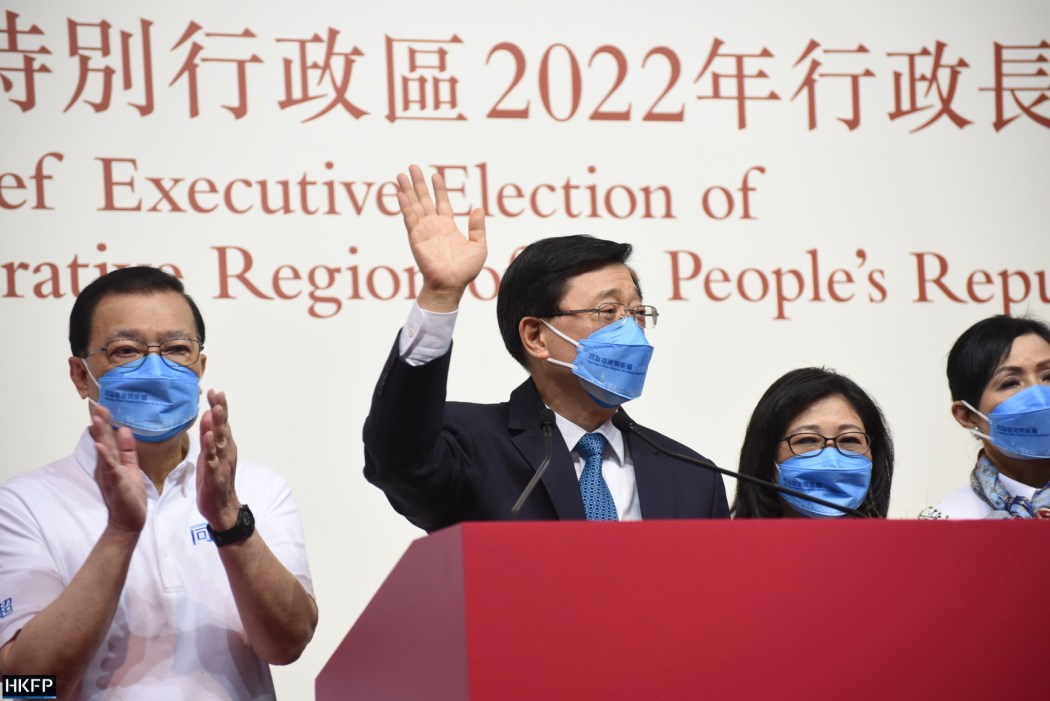Hong Kong’s next chief executive John Lee has said that it is “absolutely wrong” to say that people have been charged for simply expressing their opinions, while meeting top officials and Beijing representatives on Monday.

The day after becoming chief executive-elect, Lee met with incumbent Chief Executive Carrie Lam, Chief Justice Andrew Cheung, and President of the Legislative Council Andrew Leung, as well as representatives from four of Beijing’s biggest offices in the city.
Government reorganisation
When addressing the press with Lee after their meeting, Lam said the new electoral system that ensured “patriots govern Hong Kong” had been “successfully established.”
“In the remaining days of this term of government, we will render John every assistance that he needs to form a new government,” Lam said, adding that her administration would complete the procedures for government restructuring “in the shortest time.”
Lam revealed a plan to expand the number of government policy bureaux from 13 to 15 in January.
Referring to Lam as “the chief executive,” Lee said the two had “exchanged views on certain elements” of the reorganisation package and he would “reflect on the views” presented by Lam.

Lee and Lam did not shake hands or touch elbows when they met in public, and only waved to the cameras after reporters invited them to do so. According to Ming Pao, the chief executive-elect exchanged elbow bumps with other top officials he met that day.
Speaking during Tuesday morning’s weekly press conference, Lam said she was still waiting for the chief executive-elect’s opinions on government reorganisation to submit the related documents to the Legislative Council and its panels.
“I told John yesterday that the schedule is very, very tight. [I] hope that we can obtain the views of the chief executive-elect as soon as possible,” she said.
Local media, citing sources, reported that Lee intended to set up two new positions under the chief secretary and financial secretary in addition to Lam’s suggestions.
‘Speech crime’
Lee briefed the press after meeting with Leung at the Legislative Council, where he was asked whether he would guarantee that dissenting voices would not be “subject to speech crime,” as the reporter said nowadays “opposition to government policies can be easily criminalised and charged as sedition or even as subversion.”
Lee said he thought the reporter was “absolutely wrong” to say that “people are now charged simply because of [expressing] their… opinions.”

“That is absolutely wrong and it should not be so described. It is misleading, and actually and factually wrong,” Lee said.
He said people were brought to court on suspicion that their actions broke the law. “It is their action. That point has to be made very clear,” Lee said.
Activists Tam Tak-chi and Ma Chun-man have been sentenced to years behind bars for crimes related to speech. Last June, over 20 police officers broke down the door of a man’s flat after he displayed a flag bearing a protest slogan outside his window.
When asked about fundamental freedoms and human rights, the city’s next leader said that the liberties listed in the Basic Law, including the freedom of speech and the right to gather, “are what we own already.”
But he said it does not mean that people have the freedom to breach the law. “Therefore within the permission of the law, everyone has [a] very large [degree of] freedom,” Lee said.
‘People’s will’
Lee continued his visits on Monday afternoon, meeting with the leaders of the China Liaison Office, the Office for Safeguarding National Security of the Central People’s Government in Hong Kong, the Office of the Commissioner of the Ministry of Foreign Affairs in the city, and the Chinese People’s Liberation Army Hong Kong Garrison.
After their meeting, the Director of the Liaison Office Luo Huining said in a statement that the election of Lee with high number of votes was “a solemn choice by the Election Committee and the concentrated embodiment of the people’s will.”

“This election was law-abiding, fair and just, broadly participated in by Hong Kong’s society, and let the general public once again feel the progressiveness and superiority of the new electoral system,” Luo said. “[It] demonstrated once more to the world the right and bright prospect of the path of democratic development with Hong Kong characteristics.”
However, foreign ministers of the G7 nations – Canada, France, Germany, Italy, Japan, the UK and the United States – voiced “grave concern” over the chief executive selection process on Monday. “The current nomination process and resulting appointment are a stark departure from the aim of universal suffrage and further erode the ability of Hong Kongers to be legitimately represented,” they said.
The Liaison Office issued a statement on Tuesday in response, saying that the words of the G7 were “full of pride and prejudice” and “ignored that the election result was in line with people’s will and expectations.”
Support HKFP | Policies & Ethics | Error/typo? | Contact Us | Newsletter | Transparency & Annual Report | Apps
Help safeguard press freedom & keep HKFP free for all readers by supporting our team

LATEST FROM HKFP
HKFP has an impartial stance, transparent funding, and balanced coverage guided by an Ethics Code and Corrections Policy.
Support press freedom & help us surpass 1,000 monthly Patrons: 100% independent, governed by an ethics code & not-for-profit.










